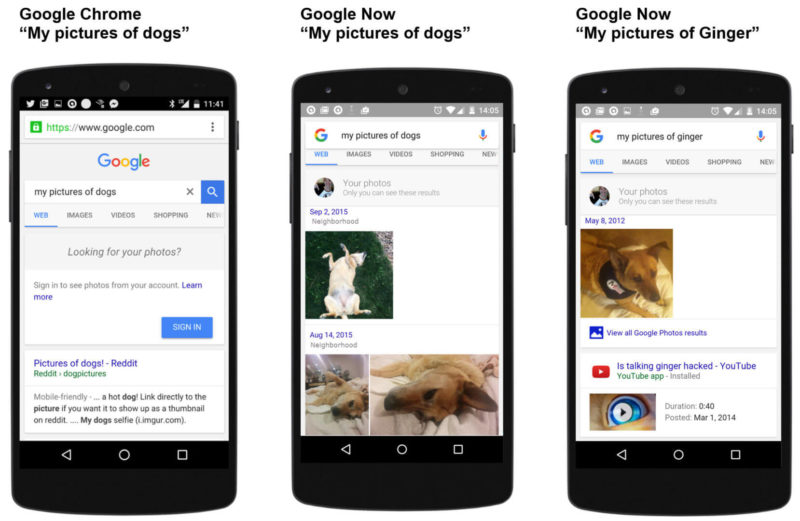Android Marshmallow Series: Google's Private index
As over-the-air updates for Android Marshmallow start slowly rolling out to some Nexus devices, many SEOs are wondering how this well-publicized update will impact mobile user behavior and search. This is especially true because Google’s enhanced predictive search utility, Now on Tap, will be deeply integrated in the browser and OS.
Google’s Private Index:
Google has always collected data from its users for the purpose of personalization (like query, browsing and click history), but now Google also keeps a searchable Private Index.
“Phone” is a new search option/index that Google has made available to all users (with or without Android Marshmallow), as in “Search my phone.” You can find it hidden in the Google Now interface when you scroll to the right in the top navigation.
This is Google’s entry to your Private Index, and it seems to be much like the Apple iOS 9 Private Index, in which information about your private mobile behavior is stored to your phone so that it can be surfaced quickly during subsequent interactions with the OS.
Unlike the iOS 9 Private Index, Google is doing its best to aggregate a user’s behavior across all devices, and their Private Index information is at least partially hosted in the cloud (as opposed to hosting it all locally on your device like with iOS 9).
What Is In The Private Index?
Items from this index can surface as contacts, emails, apps, previous searches, music and more. On both Android and iOS, you can use Google to search your Private Index for anything hosted in Google’s cloud simply by entering a query like “my flights” or “find all my pictures of dogs.”
Google Now on the Android OS seems to keep users logged in nearly perpetually, but Chrome is different. When you are logged into the same accounts in the Android OS/Google Now and in Google Chrome, the Private Index results seem to be the same. If you are not logged in on Chrome, or if you are logged into a different Google account, Private Index results can be very different, as shown in the comparison below.
Screen Crawling & Why Now On Tap Is Important For SEO
Private Index content is important because it always out-ranks organic results. Ranking content from the Private Index may be the new ultimate SEO strategy for getting to the top in mobile, but how do you get into a user’s Private Index?
Some of the Private Index information is from the Android OS and stock Android apps like the contacts list, email and Hangouts. Other information is from the user’s logged-in Google behavior on other devices and anything hosted in Google’s cloud.
With Android Marshmallow, other information may be added to your Private Index from deep-linked apps and via Google’s new screen crawler, which seems to mimic an optical character recognition (OCR) technology that can scrape and index the text from web and app screens you access on your phone (currently text only).
Screen crawling can happen at any point when you interact with your Android phone.


Comments
Post a Comment